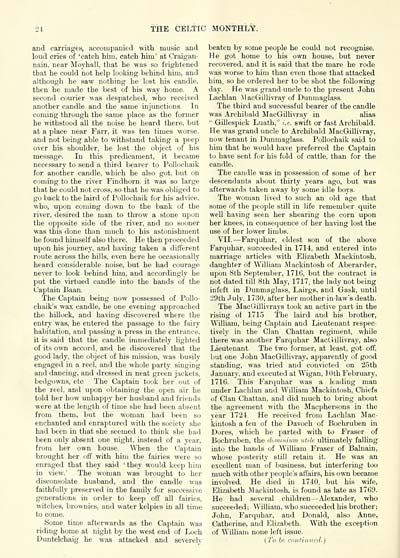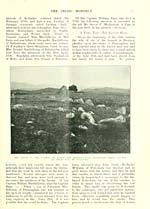Blair Collection > Celtic monthly > Volume 5, 1897
(42)
Download files
Complete book:
Individual page:
Thumbnail gallery: Grid view | List view

24
THE CELTIC MONTHLY.
and carriages, accompanied with music and
loud cries of 'catch him, catch him' at Craigan-
nain, near Moyhall, that he was so frightened
that he could not help looking behind him, and
although he saw nothing he lost his candle,
then he made the best of his way home. A
second courier was despatched, who received
another candle and the same injunctions In
coming through the same place as the former
he withstood all the noise he heard there, but
at a place near Farr, it was ten times worse.
and not being able to withstand taking a peep
over his shoulder, he lost the object of his
message. In this predicament, it became
necessary to send a third bearer to Pollochaik
for another candle, which he also got, but on
coming to the river Findhorn it was so large
that he could not cross, so that he was obliged to
go back to the laird of Pollochaik for his advice,
who, upon coming down to the bank of the
river, desired the man to throw a stone upon
the opposite side of the river, and no sooner
was this done than much to his astonishment
he found himself also there. He then proceeded
upon his journey, and having taken a different
route across the hills, even here he occasionally
heard considerable noise, but he had courage
never to look behind him, and accordingly he
put the virtued candle into the hands of the
Captain Baan.
The Captain being now possessed of Polio-
chalk's wax candle, he one evening approached
the hillock, and having discovered where the
entry was, he entered the passage to the fairy
habitation, and passing a press in the entrance.
it is said that the caudle immediately lighted
of its own accord, and he discovered that the
good lady, the object of his mission, was busily
engaged in a reel, and the whole party singing
and dancing, and dressed in neat green jackets,
bedgowns, etc The Captain took her out of
the reel, and upon obtaining the open air he
told her how unhappy her husband and friends
were at the length of time she had been absent
from them, but the woman had been so
enchanted and enraptured with the society she
had been in that she seemed to think she had
been only absent one night, instead of a year,
from her own house. When the Captain
brought her off with him the fairies were so
enraged that they said ' they would keep him
in view.' The woman was brought to her
disconsolate husband, and the candle was
faithfully preserved in the family for successive
generations in order to keep off all fairies,
witches, brownies, and water kelpies in all time
to come.
Some time afterwards as the Cajitain was
riding home at night by the west end of Loch
Duntelchaig he was attacked and severeh'
beaten by some people he could not recognise.
He got home to his own house, but never
recovered, and it is said that the mare he rode
was worse to him than even those that attacked
him, so he ordered her to be shot the following
day. He was grand-uncle to the present John
Lachlan MacGillivray of Dunmaglass.
The thii'd and successful bearer of the candle
was Archibald MacGillivray in aUas
" Gillespick Luath, " i.e. swift or fast Archibald.
He was grand uncle to Archibald MacGillivray,
now tenant in Dunmaglass. Pollochaik said to
him that he would have preferred the Captain
to have sent fur his fold of cattle, than for the
candle.
The candle was in possession of some of her
descendants about thirty years ago, but was
afterwards taken away by some idle boys.
The woman lived to such an old age that
some of the people still in life remember quite
well having seen her shearing the corn upon
her knees, in consequence of her having lost the
use of her lower limbs.
VII.— Farquhar, eldest son of the above
Farquhar, succeeded in 171-i, and entered into
marriage articles with Elizabeth Mackintosh,
daughter of William Mackintosh of Aberarder,
upon 8th September, 1716, but the contract is
not dated till 8th May, 1717, the lady not being
infeft in Dunmaglass, Lairgs, and Gask, until
29th July, 1730, after her mother-in-law's death.
The MacGlillivrays took an active part in the
rising of 1715 'The laird and his brother,
William, being Captain and Lieutenant respec-
tively in the Clan Chattan regiment, while
there was another Farquhar MacGillivray, also
Lieutenant The two former, at least, got off,
but one John MacGillivray, apparently of good
standing, was tried and convicted on 25th
January, and executed at W^igan, 1 0th February,
1710. This Farquhar was a leading man
under Lachlan and William Mackintosh, Chiefs
of Clan Chattan, and did much to bring about
the agreement with the Macphersons in the
year 1724. He received from Lachlan Mac-
kintosh a feu of the Davoch of Bochruben in
Dores, which he parted with to Fraser of
Bochruben, the dominium iiti/e ultimately falHng
into the hands of William Fraser of Balnain,
whose posterity still retain it. He was an
excellent man of business, but interfering too
much with other people's affairs, his own became
involved. He died in 1740, but his wife,
Elizabeth Mackintosh, is found as late as 1769.
He had several children — Alexander, who
succeeded; William, who succeeded his brother;
John, Farquhar, and Donald, also Anne,
Catherine, and Elizabeth. With the exception
of William none left issue.
(7'o bi' fiiii/ittued.)
THE CELTIC MONTHLY.
and carriages, accompanied with music and
loud cries of 'catch him, catch him' at Craigan-
nain, near Moyhall, that he was so frightened
that he could not help looking behind him, and
although he saw nothing he lost his candle,
then he made the best of his way home. A
second courier was despatched, who received
another candle and the same injunctions In
coming through the same place as the former
he withstood all the noise he heard there, but
at a place near Farr, it was ten times worse.
and not being able to withstand taking a peep
over his shoulder, he lost the object of his
message. In this predicament, it became
necessary to send a third bearer to Pollochaik
for another candle, which he also got, but on
coming to the river Findhorn it was so large
that he could not cross, so that he was obliged to
go back to the laird of Pollochaik for his advice,
who, upon coming down to the bank of the
river, desired the man to throw a stone upon
the opposite side of the river, and no sooner
was this done than much to his astonishment
he found himself also there. He then proceeded
upon his journey, and having taken a different
route across the hills, even here he occasionally
heard considerable noise, but he had courage
never to look behind him, and accordingly he
put the virtued candle into the hands of the
Captain Baan.
The Captain being now possessed of Polio-
chalk's wax candle, he one evening approached
the hillock, and having discovered where the
entry was, he entered the passage to the fairy
habitation, and passing a press in the entrance.
it is said that the caudle immediately lighted
of its own accord, and he discovered that the
good lady, the object of his mission, was busily
engaged in a reel, and the whole party singing
and dancing, and dressed in neat green jackets,
bedgowns, etc The Captain took her out of
the reel, and upon obtaining the open air he
told her how unhappy her husband and friends
were at the length of time she had been absent
from them, but the woman had been so
enchanted and enraptured with the society she
had been in that she seemed to think she had
been only absent one night, instead of a year,
from her own house. When the Captain
brought her off with him the fairies were so
enraged that they said ' they would keep him
in view.' The woman was brought to her
disconsolate husband, and the candle was
faithfully preserved in the family for successive
generations in order to keep off all fairies,
witches, brownies, and water kelpies in all time
to come.
Some time afterwards as the Cajitain was
riding home at night by the west end of Loch
Duntelchaig he was attacked and severeh'
beaten by some people he could not recognise.
He got home to his own house, but never
recovered, and it is said that the mare he rode
was worse to him than even those that attacked
him, so he ordered her to be shot the following
day. He was grand-uncle to the present John
Lachlan MacGillivray of Dunmaglass.
The thii'd and successful bearer of the candle
was Archibald MacGillivray in aUas
" Gillespick Luath, " i.e. swift or fast Archibald.
He was grand uncle to Archibald MacGillivray,
now tenant in Dunmaglass. Pollochaik said to
him that he would have preferred the Captain
to have sent fur his fold of cattle, than for the
candle.
The candle was in possession of some of her
descendants about thirty years ago, but was
afterwards taken away by some idle boys.
The woman lived to such an old age that
some of the people still in life remember quite
well having seen her shearing the corn upon
her knees, in consequence of her having lost the
use of her lower limbs.
VII.— Farquhar, eldest son of the above
Farquhar, succeeded in 171-i, and entered into
marriage articles with Elizabeth Mackintosh,
daughter of William Mackintosh of Aberarder,
upon 8th September, 1716, but the contract is
not dated till 8th May, 1717, the lady not being
infeft in Dunmaglass, Lairgs, and Gask, until
29th July, 1730, after her mother-in-law's death.
The MacGlillivrays took an active part in the
rising of 1715 'The laird and his brother,
William, being Captain and Lieutenant respec-
tively in the Clan Chattan regiment, while
there was another Farquhar MacGillivray, also
Lieutenant The two former, at least, got off,
but one John MacGillivray, apparently of good
standing, was tried and convicted on 25th
January, and executed at W^igan, 1 0th February,
1710. This Farquhar was a leading man
under Lachlan and William Mackintosh, Chiefs
of Clan Chattan, and did much to bring about
the agreement with the Macphersons in the
year 1724. He received from Lachlan Mac-
kintosh a feu of the Davoch of Bochruben in
Dores, which he parted with to Fraser of
Bochruben, the dominium iiti/e ultimately falHng
into the hands of William Fraser of Balnain,
whose posterity still retain it. He was an
excellent man of business, but interfering too
much with other people's affairs, his own became
involved. He died in 1740, but his wife,
Elizabeth Mackintosh, is found as late as 1769.
He had several children — Alexander, who
succeeded; William, who succeeded his brother;
John, Farquhar, and Donald, also Anne,
Catherine, and Elizabeth. With the exception
of William none left issue.
(7'o bi' fiiii/ittued.)
Set display mode to: Large image | Transcription
Images and transcriptions on this page, including medium image downloads, may be used under the Creative Commons Attribution 4.0 International Licence unless otherwise stated. ![]()
| Early Gaelic Book Collections > Blair Collection > Celtic monthly > Volume 5, 1897 > (42) |
|---|
| Permanent URL | https://digital.nls.uk/75851456 |
|---|
| Shelfmark | Blair.57 |
|---|---|
| Additional NLS resources: | |
| Attribution and copyright: |
|
| Description | A selection of books from a collection of more than 500 titles, mostly on religious and literary topics. Also includes some material dealing with other Celtic languages and societies. Collection created towards the end of the 19th century by Lady Evelyn Stewart Murray. |
|---|
| Description | Selected items from five 'Special and Named Printed Collections'. Includes books in Gaelic and other Celtic languages, works about the Gaels, their languages, literature, culture and history. |
|---|

